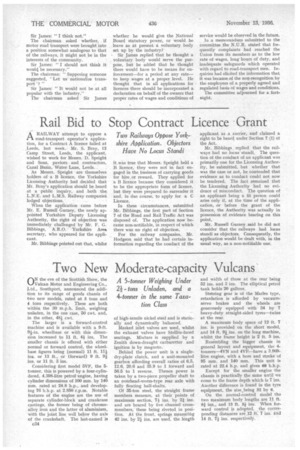Rail Bid to Stop Contract Licence Grant
Page 92

If you've noticed an error in this article please click here to report it so we can fix it.
Two Railways Oppose Yorkshire Application. Objectors Have No Locus Standi ARAILWAY attempt to oppose a road-transport operator's application, for a Contract A licence failed at .Leeds, last week. Mr. S. Bray, 12 Camp Street, Leeds, the applicant, wished to work for Messrs. 13. Speight and Sons, paviors and contractors, Canal Bain, Water. Lane, Leeds.
As Messrs. Speight are themselves holders, of a B licence, the Yorkshire Licensing Authority had decided that Mr. Bray's application should be heard at a public inquiry, and both the. L.N.E. and L.M.S. Railway companies lodged objections.
When the application came before Mr. E. Russell Gurney, the newly appointed Yorkshire Deputy Licensing Authority, the right of objection was immediately challenged by Mr. F. G. Bibbings, A.R.O. Yorkshire Area secretary, who appeared for the applicant.
Mr. Bibbings pointed out that, whilst it, was true that Messrs. Speight held a B licence, they were not in fact engaged in the business of carrying goods for hire, or reward. They applied for a 13 licence because they considered it to be the appropriate form of licence, but they were prepared to surrender it and, in due course, to apply for a C Licence.
In these circumstances, submitted Mr. Bibbings, the first part of Section 7 of the Road and Rail Traffic Act was disposed of. The application now became non-notifiable, in respect of which there was no right of objection.
For the railway companies, Mr. Hodgson said that he had certain information regarding the conduct of the applicant as a carrier, and' claimed a right to be heard under Section 7 (I) of the Act.
Mr. Bibbings, replied that the railways had no locus stanch. The question of the conduct of an applicant was primarily one for the Licensing Authority, he submitted, but whether that was the case or not, he contended that evidence as to conduct could not now be tendered. The fact remained that the Licensing Authority had no evidence of misconduct. The question of an applicant being a fit person could arise only if, at the time of the application, or before the grant of the licence, the Authority was actually in possession of evidence bearing on this point.
Mr. Russell Gurney said. he did not consider that the railways had locus standi as objectors. Consequently, the application would be dealt with, in the usual way, as a non-notifiable one.








































































































































































